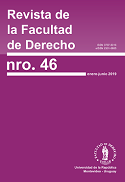Social Networks, Consumers and Intellectual Property
Case-law commentary on Judgment 14/07300, of the Court of Great Instance of Paris, of August 7, 2018
DOI:
https://doi.org/10.22187/rfd2019n46a13Keywords:
Social Networks, Consumers, Intellectual Property, Unfairterms, CopyrightAbstract
Do users of social networks have a consumer entity? If the answer to this question is affirmative, a catalog of rights is immediately activated, such as, for example, the legitimacy to initiate a judicial proceeding. European legislation on consumer rights is harmonized and has a very protective nature. Until now, in the interaction with social networks, the user was compelled to contract a "blank check" that involved the transfer of a large part of their rights, such as, for example, the copyright that might correspond to the transferee. The owner of the social network. But, the recent decision of the Court of Large Instance of Paris has reversed the legal position of a group of French consumers, who filed a class action against the social network Twitter, to give them the reason, after describing as "abusive" most clauses and condemn the social network to pay the French Consumer Association 30,000 euros. This paper analyzes this important judicial resolution, in order to draw the most relevant implications that impact on the right of consumers and users of the civil normative sector, in general, and in intellectual property-une création du droit- (Bergé, 2015), in particular.
Downloads
References
Albadalejo, M. (2013). Derecho de obligaciones. Madrid: Edisofer.
Bergé, J. S. (2015). La protection internationale et européenne du droit de la proprieté intellectuelle. Bruselas: Larcier.
Cabedo Serna, L. (2011). El derecho de remuneración del autor. Madrid: Dykinson.
Carballo Fidalgo, M. (2013). La protección del consumidor frente a las cláusulas no negociadas individualmente. Disciplina legal y tratamiento jurisprudencial de las cláusulas abusivas. Barcelona: Bosch.
Díez-Picazo, L. (2007). Fundamentos del derecho civil patrimonial I. Pamplona: Aranzadi. Thomson Civitas.
Dusollier, S. y Francquen, A. (2015). Manuel de droits intellectuels. Bruselas: Anthemis.
Ebers, M. (2009). “Un fair Contract Terms Directive 93/13” En H. Schulte-Nölke, C. Twigg, Flesner, M. Ebers (eds.), EC Consumer Law Compendium. The Consumer Acquis and its Transposition in the Member States. Munich: Sellier.
Lasarte Álvarez, C. (2014). Manual sobre protección de consumidores y usuarios (6º ed.). Madrid: Dykinson.
Leczykiewicz, D. y Weatherill, S. (2018). The images of the Consumer in the EU Law. Oxford: Hart.
Mallo Montoto, D. (2018) La difusión en Internet de contenidos sujetos al derecho de autor. Madrid: Reus. (Col. de Propiedad Intelectual).
Martínez de Aguirre, C. et al. (2014). Derecho de obligaciones (4ª ed.). Madrid: Colex.
De Nova Labián, A. (2010). Delitos contra la propiedad intelectual en el ámbito de internet. Madrid: Dykinson.
De Sanctis (1959). Enciclopedia del Diritto. Roma: Giuffre Editore.
Pérez Daudí, V. (2018) La protección procesal del consumidor y el orden público comunitario. Barcelona: Atelier.
Recht (1949). Reflexions sur la protection du droit d ´auteur (Vol. 2). París: BDA.
Riahi, K. (2013). Les contrats de la production. París: Dixit.
Romero Robredo, A. (2017). Privacidad e intimidad en las redes sociales. Madrid: Re-Unir.
Rosenberg, M. (2016). The Price of Privacy: How access to digital privacy is slowly be coming divided by class. UCLA: Journal of Law & Technology.
Rosillo Fairén, A. (2010). La configuración del contrato de adhesión con consumidores. Madrid: La Ley.
Stiglitz, G. (1991). El Derecho contractual y la protección jurídica del consumidor en América Latina. Madrid: Instituto Nacional de Estudios Jurídicos
Vicent Chuliá, F. (2000). Las acciones colectivas de condiciones generales y su impacto en los sectores de contratación especial. Revista General de Derecho, 56(663).
Voirin, P. y Goubeaux, G. (2016). Droit civil (36ª éd.). París: Lex tenso éditions,
Published
How to Cite
Issue
Section
License
This journal provides open access to its content, based on the principle that providing the public with free access to research helps a greater global exchange of knowledge
Revista de la Facultad de Derecho. Creative Commons Reconocimiento 4.0 Internacional License.


